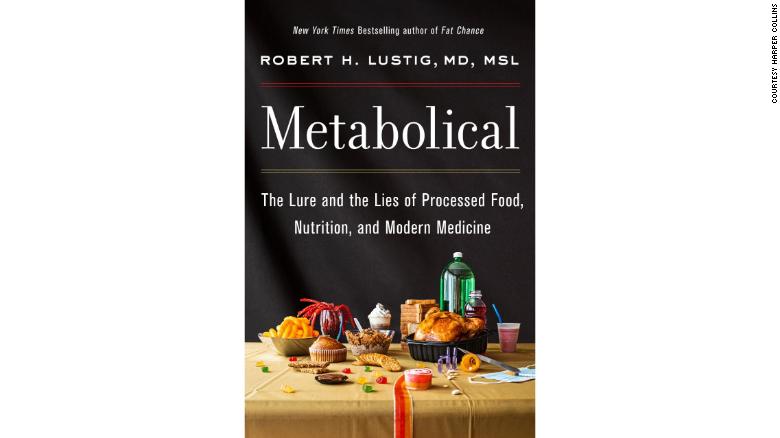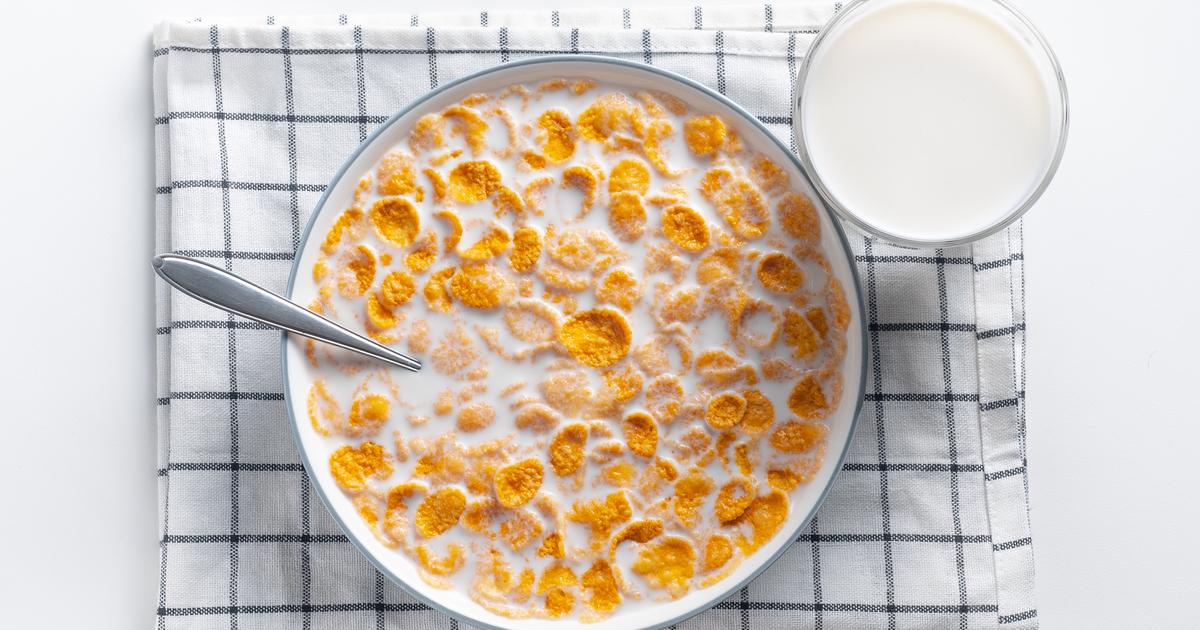Countries with the highest obesity rate in America 0:51
(CNN) -
As a nutritionist, I am aware of many debates in the nutrition world about the foods that keep us healthy and the foods that actually cause illness.
Each food offers different nutritional benefits for general health.
And even packaged foods can be part of a healthy diet.
"The food industry is working hard to provide consumers with a market full of healthy, affordable, and nutrient-packed food and beverage options," said Krystal Register, registered dietitian and director of health and wellness for the Food Industry Association. (IMF), in a statement to CNN.
But I know that the unhealthy eating habits I see are often linked to eating too many ultra-processed foods high in sugar, salt, and unhealthy fats.
So I was eager to talk to pediatric neuroendocrinologist Dr. Robert Lustig about his new book, "Metabolical: The Lure and the Lies of Processed Food, Nutrition, and Modern Medicine." , nutrition and modern medicine ').
In "Metabolical: The Lure and the Lies of Processed Food, Nutrition, and Modern Medicine," Dr. Robert Lustig explores how processed foods have created a pandemic of diseases such as obesity and diabetes.
Lustig, a professor emeritus at the University of California, San Francisco who is dedicated to treating and preventing childhood obesity and diabetes, is also the author of the bestseller "Fat Chance: Beating the Odds Against Sugar, Processed Food, Obesity, and Disease." , which discusses the dangers of excess sugar, its relationship to obesity, and what we can do about it.
advertising
This conversation was summarized and edited for clarity.
CNN: You suggest that the food industry has modified the food we eat, knowing that it can kill us. It's true?
Dr. Robert Lustig:
Really.
The food industry knows that when sugar is concentrated, it becomes addictive.
The more sugar added to processed foods, the more addictive they become.
They also know that when they concentrate sugar, it causes fat in the liver, leading to insulin resistance, metabolic syndrome, and death, and they do it anyway.
8 keys to ending carbohydrate addiction
CNN: Doesn't the amount of sugar we eat influence?
Lustig:
Yes, if you could change the amount.
The problem is, you can't do that with addictive substances.
That is why they are addictive.
The same is true for all hedonic substances such as cocaine, nicotine, and heroin.
When someone says, "I have a sweet tooth," that is addiction to sugar.
Do you really think that people can moderate their food intake when it is designed to do the exact opposite?
Editor's Note:
There is no universal agreement among scientists and nutritionists that sugar or processed foods are addictive.
On the other hand, CNN asked P. Courtney Gaine, registered dietitian and president and CEO of The Sugar Association, to comment on Lustig's statements.
Gaine said that "unsubstantiated and inflammatory rhetoric about sugar, or any other aspect of the diet, does not bring us closer to the goal of healthy consumers"].
CNN: How do we distinguish between addictive processed foods and other types, like canned legumes and frozen vegetables?
Lustig:
There are different levels of processing.
In Brazil's NOVA food categorization system, class 1 is food that is not adulterated in any way, such as an apple.
Class 2 are mechanically separated foods, such as sliced apples.
Class 3 is one in which something has been removed or added, such as applesauce, and class 4 is one in which the matrix of the food has been destroyed, and the ingredient has been added to other foods to achieve a greater palatability, like an apple pie.
Fiber has usually been removed and sugar has been added.
Class 4, the ultra-processed category, is the one that predicts morbidity and mortality and accounts for 56% of the food and 62% of the sugar consumed in the United States.
Diabetes drug may help you lose weight, study finds
CNN: Tell me about the relationship between sugar and diabetes.
Lustig:
First of all, to show that sugar causes diabetes, we have to show that the toxicity of sugar is independent of its inherent calories.
And we have to show that sugar toxicity is independent of obesity.
Second, it is not the same to speak of correlation as it is of causality.
There are only two levels of data that can tell if something is causal.
One is randomized controlled trials, and the other is called econometric analysis.
Do we have either of these two for sugar and diabetes?
Indeed.
In 2013, we took three data sets that spanned 10 years.
This econometric analysis showed that total calories were unrelated to the change in the prevalence of diabetes in all countries over the decade.
And the rest of the elements, no signs, except the sugar.
The effect of sugar on diabetes was very strong.
If a country had 150 more calories per person per day, the prevalence of diabetes increased by 0.1%.
But if those 150 calories were a can of soda, the prevalence of diabetes was multiplied by eleven, that is, by 1.1%.
And in the United States we do not consume a can of soda a day, but we consume (on average) the equivalent of two and a half cans.
In another study, a randomized controlled trial, we eliminated sugar from the diets of 43 children with metabolic syndrome.
Since that would reduce their calories by about 400 a day, we substituted starch for sugar, as we wanted them to remain the same weight.
We remove the sweet cakes and replace them with savory breads.
We gave them foods that children would eat, but without added sugar.
All of these children kept their weight stable.
Ten days later, we found that all aspects of his metabolic health improved.
We measure your fat deposits, subcutaneous fat, visceral fat, and liver fat.
And what we found was that their subcutaneous fat didn't change because they didn't lose weight.
His visceral fat (belly fat) was down 7%, while his liver fat was down 22%.
It is liver fat that makes the liver dysfunctional, causing the pancreas to produce more insulin, leading to chronic metabolic disease.
The improvement in insulin response showed that their metabolic disease was reversed, simply by removing sugar from their diets and replacing it with starch.
That is causality.
CNN: You
claim that changing what we eat can reduce the risk of many diseases, because a healthy diet will address mitochondrial dysfunction, which is when the structures that produce energy for a cell malfunction, ultimately leading to chronic disease.
However, you say that this problem is nutritional.
How do you explain it?
Lustig:
A diet that protects the liver and feeds the gut is "edible."
This means a diet low in sugar and high in fiber.
Real food.
This includes anything that came out of the ground and any animal that ate what came out of the ground.
All foods are inherently good.
What is not good is what we do with food.
People should think of food labels as a warning label.
What you really need to know is what has been done to the food, but that is not on the label.
But here's how you can tell: First, if a food has no label, that's good, because nothing has been done to it.
Second, if a food has a label, look for three things:
If sugar is one of the first three ingredients, it is a dessert.
Return it.
The problem is that there are 262 names for sugar.
And that's on purpose.
The industry hides sugar in plain sight.
Look at the fat.
If it says soybean oil or palm oil or cottonseed oil or any of these seed oils, these are omega-6s and they have been added.
These promote inflammation and that is a problem.
Look at the fiber.
Take your total carbs and divide it by dietary fiber, and if the ratio is less than 5, then that's fine.
It means that the manufacturer did not remove a lot of fiber in the process.
CNN: When it comes to weight management, you say that the type of calories we consume is important. Can you explain it?
Lustig:
Let's take almonds for example - you eat 160 calories, but only absorb 130 calories.
What about the other 30?
They are for the bacteria in the gut.
We all eat for 100 trillion, that is, the bacteria of the gut microbiome.
It's not about how many calories pass through your lips, but how many calories are absorbed.
Fiber is the nutrient that is not absorbed.
If you don't feed your bacteria, they feed on you.
It produces a 'leaky gut' and inflammation, leading to insulin resistance, weight gain and disease.
A high fiber diet reverses this.
A diet soda alone does not make you fat, but the combination with carbohydrates does, according to a study
CNN: What about artificial sweeteners? Can you help us if we have a sweet tooth and want to limit sugar?
Lustig:
We don't know for sure.
Artificial sweeteners continue to activate insulin.
The sweet message goes from the tongue to the brain, then from the brain to the pancreas, which says: "The sugar comes, releases the insulin", but then the sugar does not arrive because it was a synthetic sweetener.
Doesn't the pancreas release insulin?
No, so you still gain weight (as if you were consuming an excess of sugar).
CNN: Do you think consuming "real food" instead of ultra-processed foods can prevent deadly diseases?
Lustig:
Yes. Genes play different roles in different diseases.
Monogenic diseases, such as sickle cell anemia and cystic fibrosis, involve gene mutations.
These diseases cannot be modified by diet.
But chronic diseases, such as heart disease, Alzheimer's disease, and nonalcoholic fatty liver disease, are polygenic, which means that the environment plays a much larger role.
If you have a tendency to suffer from a chronic disease, the best thing you can do is fix your environment to fix your mitochondria.
That means not poisoning them.
What poisons them?
Sugar is number 1. Lack of omega-3 is number 2. An excess of omega-6 is number 3. Lack of fiber that leads to leaky gut is number 4.
Fixing your diet does not mean that you are guaranteed success, but getting rid of processed food is the most effective, if not the easiest thing you can do to restore your health, vitality and longevity.
–Lisa Drayer is a nutritionist, author, and CNN health and nutrition contributor.
Nutrition







